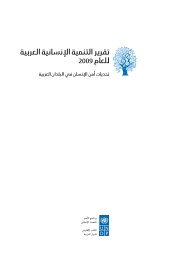arab human development report 2003 - Palestine Remembered
arab human development report 2003 - Palestine Remembered
arab human development report 2003 - Palestine Remembered
- No tags were found...
You also want an ePaper? Increase the reach of your titles
YUMPU automatically turns print PDFs into web optimized ePapers that Google loves.
presence of significant <strong>human</strong> capital thatfinds refuge in creativity from a restrictive societaland political environment and thatcould, under favourable circumstances, providea solid structural foundation for a knowledgerenaissance.CUMULATIVE KNOWLEDGEOUTCOMES: ENDS AND MEANSThe Report Team polled a sample of Arab universityfaculty members about knowledge acquisitionin the region. Respondents expresseddissatisfaction in general with the status ofknowledge acquisition in their countries (theaverage degree of satisfaction was 38%). Theirsatisfaction with the extent to which Arabknowledge serves <strong>human</strong> <strong>development</strong> wasslightly less (the average rating was 35%). Thesurvey confirmed that incentives for knowledgeacquisition in Arab countries need to bemuch stronger, while freedom to acquireknowledge is subject to many constraints.Rating the various aspects of the knowledgesystem, respondents argued that the lackof a reasonable measure of freedom in radioand television (30%) was one of the largest disincentivesto knowledge acquisition. The sameassessment applied to research and <strong>development</strong>in the public sector although, in the viewof respondents, the latter area enjoys a higherlevel of freedom, thus suggesting that its problemshave more to do with matters of organisationand financing.In order to compare the knowledge capitalof Arab countries with that of other countries,the Report explores a new composite indexconstructed from 10 indicators relating to differentdimensions of knowledge capital. Thisattempt at measurement faced several limitationsin data and methodology yet indicatedthat the Arab countries are far behind theleading developing countries, let alone the advancedindustrialised countries, in the qualityand quantity of their knowledge capital.Struck by inconsistent or counterintuitiveresults from applying this index, the ReportTeam also considered seven cumulativeknowledge outcomes or end results (such asexports with a high technological content andother outcomes), and their relationship toother knowledge indicators. The analysisshowed no correlation between the twogroups.The analysis concludes that the key challengefacing Arab countries does not consistonly of catching up with other countries interms of knowledge indicators; rather, it goesbeyond that to include working hard toachieve similar knowledge outcomes by developingsolid institutional structures and bycrystallising the requisite political will, supportedby sufficient resources, especially at thepan-Arab level.IMPORTED TECHNOLOGY:CONSUMPTION VERSUSADOPTIONArab countries’ experiments with the transferand adoption of technology have neitherachieved the desired technological advancementnor yielded attractive returns on investments.Importing technology has not led to itsadoption and internalisation in the host country,let alone to its diffusion and production.The two biggest gaps accounting for thisfailure have been the absence of effective innovationand knowledge production systemsin Arab countries, and the lack of rational policiesthat ingrain those essential values and institutionalframeworks that support aknowledge society. These problems have beenaggravated by the mistaken belief that aknowledge society can be built through theimportation of scientific products without investingin the local production of knowledge,and through depending on cooperation withuniversities and research centres in advancedcountries for training Arab scientific cadreswithout creating the local scientific traditionsconducive to knowledge acquisition in the region.The lack of national innovation systems inArab countries represented, in effect, a wasteof investment in industrial infrastructure andAli Mustafa Musharrifah: On the Importance of the History ofScience for the Advancement of Knowledge“Civilised nations must have a cultureassociated with their history of scientificthought. … Our scientific life in Egyptneeds to catch up with our past in orderto acquire the necessary strength, lifeand controls. We in Egypt transfer theIncentives forknowledge acquisitionin Arab countries needto be much stronger.Importing technologyhas not led to itsadoption andinternalisation in thehost country, let aloneto its diffusion andproduction.knowledge of others then leave it floatingwithout any relationship to our pastor any communication with our land. Itis a foreign commodity that is strange inits looks, strange in its words and strangein its concepts.”EXECUTIVE SUMMARY 5







